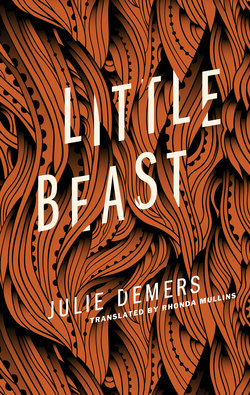Читать книгу Little Beast - Julie Demers - Страница 7
На сайте Литреса книга снята с продажи.
III
ОглавлениеThe animals’ howls slip under the door. An entire bestiary is pawing at the cabin walls. But I know the animals won’t come in. I’m not scared, no way.
Everything in my safe haven is calm and suspended in mid-air. The steam from the pots coats the walls of the cabin and clings to the windows. The wood is so damp that mould blooms on it. I let the water boil to watch the liquid go where it will – a massive wave receding. All around me the walls close in and calm me. The floor creaks. The dust accumulates. Particles of it fall and fall, and fall some more.
The provisions, left here by someone else and stored in the crawl space under the floor, are dwindling. So far, I’ve crunched on sixty-seven apples, peeled thirty carrots, sliced twenty-two cabbages, and boiled I don’t know how many potatoes. All that is left is a bag of turnips. Thirty-six rancid turnips, to be precise.
My worldly possessions fit in a tanned hide bag: three pencils, a penknife, a sewing needle, two ration stamps, a book of matches, marbles, and a notebook. There is also an old hare lying on the table, no life, no breath.
It takes military discipline to keep track of time. When I wake up, I look through the window to study the traces of things that have passed this way, the signs of time elapsing, trails in the snow that keeps on snowing. I spot hooves and claws. I study the migration of species. Traces of blood don’t scare me one bit. As long as there are no boot prints in the snow, I’m in no danger. Once my worries lift and I am certain that the Boots are far away, I add a mark to my 1944 Gaspésie calendar.
I look out at the storm that just keeps storming. There, right out there, the bushes, the animals, and the dens are being buried in snow, the ice bridges are collapsing. All around, animals have built coffins of ice. They stay awake by blinking an eye, as if they have put life in parentheses, and I alone watch winter without joining in, my forehead resting on the window pane. I don’t even dare stick my nose outside. If I were to open the window, my nostrils would freeze shut; they would stick together, and it would be the end of me. It is hard to bring the outside in. It always hurts a little.
There is no smoke rising up through the branches around me. There are no human smells (dirty, foul smells). Only a few animals know the way here. They are called wolves, cougars, flying squirrels, moose, and deer. When we come face to face, we look at each other the way we would look at a foreigner, with a mix of respect and fear. Sometimes guile wins, and it is better to stay hidden. We recognize each other by our tracks.
I take Hare’s body and press it to my chest. I take my chest and press it to Hare’s body. He spent the night by the fire, and now, even though he is gone, it is like he is here. I rock him and hear him purr. He digs a delicate furrow in my neck. Hare looks at me through beady little eyes set in his eye sockets, and even though he is dead, we still love each other with a love that cannot be denied.
Sometimes I take him with me to the cistern. The water, the heat, and our bodies pressed against each other make us forget that we are not of the same species. What purpose does a species serve, anyway?
I look Hare and his furry, grey pelt up and down. I grab his body, squeeze it, press my face into his carcass. The smell of his decay envelops me. With his big, wild eyes, Hare tells me it is my fault he has no more flesh, that he isn’t moving. Yes, I was a formidable trapper. I had loads of snares. I put them in the forest, hoping to collar the necks of the living. Preening animals let themselves be trapped; that is what happened to Hare. It was a long time ago, in the village of Rivière-à-Pierre, before the cabin doors shut forever, never to be opened again, and I lost face.
Rivière-à-Pierre. The name paints an image. I can see my village from here. Yes, I can see it, I swear, with my eyes that remember. The men bring home their bodies and their prey. Their beards are longer than before. The women’s cries are as plaintive as can be. Mother wears her shawl of misery over her hunched shoulders.
The memories are vivid.
But I must fight them.
But the memories are vivid.
But I must fight them.
No.
It’s not weakness.
Yes.
It’s a wave of fatigue.
